Are you the advanced
one?
The one spotting
inconsistencies
The one who’s jumped
from cage to cage
Suspecting there is no
way
But not sure
But not sure
And why do you jump, Pilgrim?
We are such fragile
things
Pillows are what we
crave
And a nice bottle of
ease
You’ve jumped long
enough to know
On days like this
The forward effort
Takes so much
Depends on white
chickens
On red wheelbarrows
Yet they never turn up
It would seem
It would seem
Probably you wonder
How does anyone do a
damn thing
When their hero has
turned out a coward?
You mull it over
Get distracted by it at
lunch
An hour with the windy
park wind
Tearing through your
sandwich
Hair over your face
Nose runny
Not sure if
perpetuating
The ape shit routine
The trajectory of the
suppose-to
Means you’ve changed
And: Have you changed?
And the suspicion comes
up with the laundry
Is the whole thing a
whirling junk?
Some natural stain
Pathogen of energy
Do you look upon your
old account
As the stumbling
discord
Of some mature dog:
Beat up coat
Ragged yellow teeth
Wistfully thinking
The course of events
Is not karmic
Not a lesson wrapped in
pain
But the dead end
Dead end
But the dead end
Of happenstance chaos
Of sordid laughter
And does a longing
develop, Pilgrim?
A day dream
In far off dystopia
Where the underground
sends for you
Oh, you want it so bad
The channels finally
alerted
To your soft honesty
That deep trying
That story telling
Always present in the
back of the mind
A few tests
They locate your
resolve:
You clean up some
evidence
You don’t snitch
And when a note is left
You follow it
Immediately
The heart up your
throat
Up above the overcast
Up some urban slum
Shambled, empty
Hope on your sleeve
The butterfly euphoria
Atop the roof
A figure waits
And there!
An angel dressed in dungarees
An elderly man smiles
Smiles with his eyes
My God! With his eyes!
Reveals the whole thing
The Angel speaks:
Do you want to know the
reason
For our failing schools
Our failing nerves
Do you want to know the reason
The reason you cannot go on
In this whirling shit
Like a caged
Cage
Like a caged
Yes
Yes I do
